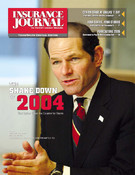The Arkansas Insurance Department has begun an investigation into the practices of Arkansas insurance brokers and companies in light of the recent bid-rigging allegations against one of the nation’s top brokers.
The action follows New York Attorney General Eliot Spitzer’s recently filed complaint against Marsh & McLennan Companies Inc. (Marsh), alleging that Marsh cheated corporate clients by rigging bids and collecting huge fees from major insurance companies for directing business to the insurers. Marsh allegedly steered business toward certain insurers at designated prices and would then solicit false or inflated quotes from other insurers to give the appearance of real competition for the business.
Providing false or inflated quotes to eliminate competition in the State of Arkansas is illegal and would be considered a fraudulent insurance act under Arkansas Insurance Code, the department said.
In announcing the investigation, Insurance Commissioner Mike Pickens said, “An insurance producer’s compensation should never negatively influence his or her recommendations to insurance consumers.
“We certainly do not expect that this kind of illegal activity is occurring in Arkansas,” he continued. “Nonetheless, we are exercising our fiduciary duty to protect Arkansas consumers. We will not tolerate an insurance producer placing his or her own financial interest above that of his client.”
Although the investigation will not target agents, the department reminded insurance producers of their existing compensation requirements and limitations under the Arkansas Insurance Code. Arkansas Code Ann. § 23-66-310, such as:
1. With some specified exceptions, a person cannot willfully collect as premium or charge for insurance any amount in excess of the premium or charge contained in the insurance policy.
2. A property and casualty agent may charge a fee in addition to the premium for a policy in accordance with the carrier’s rate filings as long as: (a.) Each fee is separately disclosed on the billing statement and delivered to the insured; and (b.) The sum of the fees and commission does not exceed 20 percent of the total gross premium for the contract.
With respect to brokers, while a broker falls within the definition of an “insurance producer” under Arkansas’ Producer Licensing Model Act (see Ark. Code Ann. §23-64-501), brokers are distinguished from other insurance producers in that instead of representing the insurer, a broker represents an insured or prospective insured (client) with whom the broker transacts insurance and from whom the broker may also receive a fee. Although a broker is legally the agent of the insured, in some instances, a broker may also receive compensation for the same transaction from an insurer or another insurance producer. Special compensation disclosure requirements, therefore, appear in order for insurance producers acting as brokers.
The department is drafting a rule to impose additional compensation disclosure requirements upon insurance producers acting as brokers. It likely will be based on the NAIC Model Law currently in the drafting phase.
Was this article valuable?
Here are more articles you may enjoy.


 What Berkshire’s CEO Abel Said About Insurance
What Berkshire’s CEO Abel Said About Insurance  ‘Meaningful Decline’ in Industry Q1 Underwriting Profit Expected From Winter Storms
‘Meaningful Decline’ in Industry Q1 Underwriting Profit Expected From Winter Storms  Commercial P/C Market Softest Since 2017, Says CIAB
Commercial P/C Market Softest Since 2017, Says CIAB  Florida Appeals Court Pulls the Plug on Physician Dispensing in Workers’ Comp
Florida Appeals Court Pulls the Plug on Physician Dispensing in Workers’ Comp 


